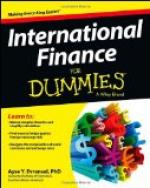These bonds and stocks and shares are the machinery of international finance, by which moneylenders of one nation provide borrowers in others with the wherewithal to carry out enterprises, or make payments for which they have not cash available at home. It was shown in a previous chapter that bills of exchange are a means by which the movements of commodities from market to market are financed, and the gap in time is bridged between production and consumption. Stock Exchange securities are more permanent investments, put into industry for longer periods or for all time. Midway between them are securities such as Treasury bills with which Governments raise the wind for a time, pending the collection of revenue, and the one or two years’ notes with which American railroads lately financed themselves for short periods, in the hope that the conditions for an issue of bonds with longer periods to run, might become more favourable.
So far we have only considered the machinery by which these securities are created and issued to the public, but it must not be supposed that investment is only possible when new securities are being offered. Many investors have a prejudice against ever buying a new security, preferring those which have a record and a history behind them, and buying them in the market whenever they have money to invest. This market is the Stock Exchange in which securities of all kinds and of all countries are dealt in. Following the history of the Ruritanian loan, we may suppose that it will be dealt in regularly in that section of the Stock Exchange in which the loans of Foreign Governments are marketed. Any original subscriber who wants to turn his bonds into money can do so by instructing his broker to sell them; anyone who wants to do so can acquire a holding in them by a purchase. The terms on which they will be bought or sold will depend on the variations in the demand for, and supply of, them. If a number of holders want to sell, either because they want cash for other purposes, or because they are nervous about the political outlook, or because they think that money is going to be scarce and so there will be better opportunities for investment later on, then the price will droop. But if the political sky is serene and people are saving money fast and investing it in Stock Exchange securities, then the price will go up and those who want to buy it will pay more. The price of all securities, as of everything else, depends on the extent to which people who have not got them demand them, in relation to the extent to which those who have got them are ready to part with them. Price is ultimately a question of what people think about things, and this is why the fluctuations in the price of Stock Exchange securities are so incalculable and often so irrational. If a sufficient number of misguided people with money in their pockets think that a bad security is worth buying they will put the price of it up in the face of the logic of facts and all the arguments of reason. These wild fluctuations, of course, take place chiefly in the more speculative securities. Shares in a gold mine can go to any price that the credulity of buyers dictates, since there is no limit to the amount of gold that people can imagine to be under the ground in its territory.




